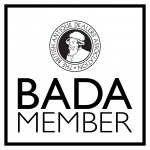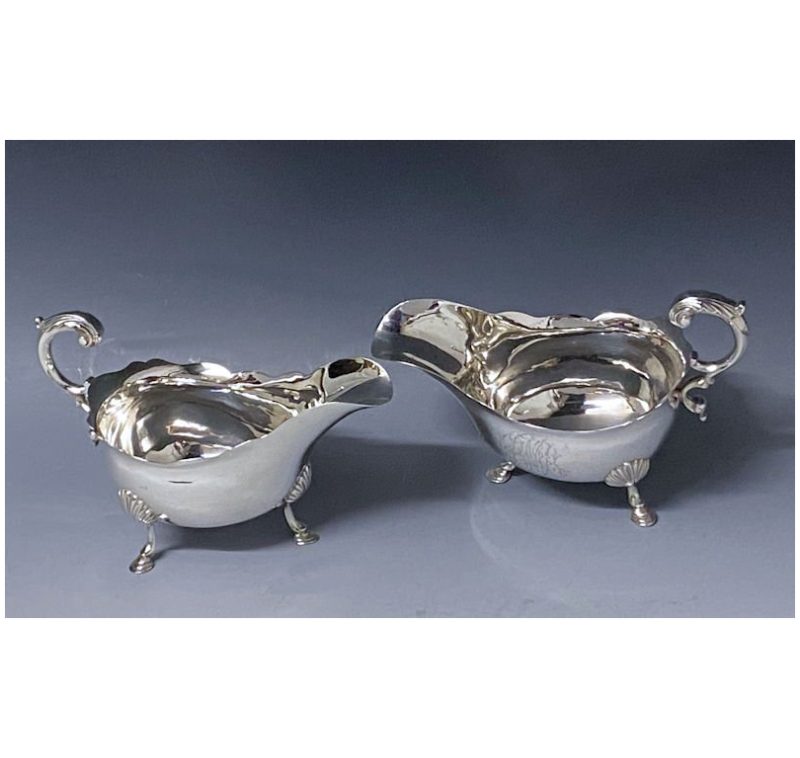
Abraham Portal
Member of a Huguenot family originating in Bagnolssue Ceze, Languedoc . Guillaume Portal born 1639, was ‘of the Great Wardrobe’ of William III and Anne. His brother Jean Francois also fled to England, father of three sons and seven daughters.
The second son Pierre Guillaume became rector of Clowne , County Derby , c1724 and South Fambridge, County of Essex in 1734. His first son Andrew took orders and was vicar of St. Helen’s Abingdon. Abraham, his second son, described as son of William Portal of Prittlewell in the Country of Essex clerk, was apprenticed to Paul De Lamerie 3 July 1740 on Payment of £35.
Free, 7 March 1749. Mark entered as largeworker, 26 October 1749. Address: Rose Street, Soho. Moved into the precinct of the Savoy, 29 September 1750. Moved to the Strand, 1 June 1753. Livery, June 1763.
Heal records him as goldsmith, jeweller and dramatist, Rose Street, Soho 1749; Salmon and Pearl, 34, Ludgate Hill, 1763-78 and Castle Street, Holborn, 1795, died 1809; also, in partnership with Harry Gearing as goldsmiths, jewellers and toymen, at Ludgate Hill address, 1774, bankrupt 1778. He appears as goldsmith, Ludgate Hill, in the Parl. Report list 1773. His brother William was apprenticed to him, 1750. Abraham married firstly Elizabeth Bedwell of Abingdon (where his brother was vicar) , who bore him two sons and four daughters , one of whom, Anne , married Moreton Welhouse and became mother of Edward , 1st Lord Hatherton.
Portal is one of the very few goldsmiths to appear in the Dictionary of National Biography, on account of his literary activities. He first appears in Biographica Dramatica (1812): Failing in this (i.e., as a goldsmith) he commenced bookselling in the Strand (cf, the move of 1753, above) in which he was more successful. He finished his career as box-keeper at Drury Lane Theatre, but we cannot learn the time of his death. His first play was Olindo and Sophronia a tragedy 1758. “This play is a very indifferent one and was never brought on the stage. The story of it is taken from Tasso’s Gieruselemme Liberata. The author tells us that was his virgin tragedy, the effort of almost unassisted nature, the solace and amusement of the leisure hours of one who has hitherto passed his time not in the learned and peaceful retreats of the Muses, but in the rude and noisy shop of Vulcan’.
Portal’s further plays published were The Indiscreet Lover, comedy 1768; The Cady of Bagdad, opera 1778, performed for one night at Drury Lane (the songs only printed) and Vortimer or The True Patriot 1796. In 1781 he produced a volume of Poems with dedicatory lines to Richard Brinsley Sheridan, with whom he claimed friendship and containing a Sonnet to Sheridan’s wife, the beautiful Elizabeth Linley, and a Monody on the death of her brother Thomas. Portal’s second son was christened Richard Brinsley, whose godfather seems little in doubt.
Portal’s work, as may be expected from his flirting with the literary muse, is rare, but shows on occasions a reasonable accomplishment, perhaps the work of his journeymen. His evidence to the Parl. Report Committee in 1773, of the difficulty he found in distinguishing the marks on Sheffield plate from those on silver, leaves doubts as to whether bad eye-sight, ineptitude or business spite was the reason.
He died in Castle Street, Holborn, January 1809, and was buried at St. Andrews’s, leaving less than £1000. (Some of the of the above details came from Sir William Portal, Bart, Abraham Portal and his descendants 1925.







